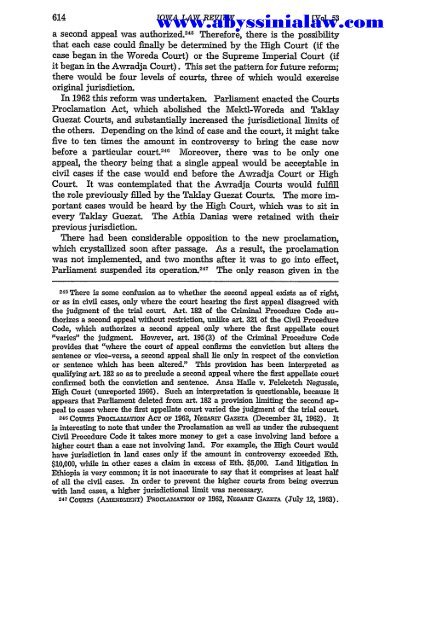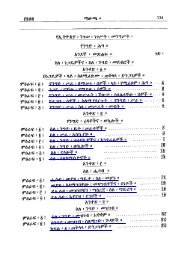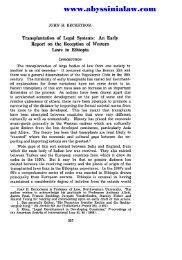You also want an ePaper? Increase the reach of your titles
YUMPU automatically turns print PDFs into web optimized ePapers that Google loves.
IOWA LAW REVIEW<br />
a second appeal was authorized. 245 Therefore, there is the possibility<br />
that each case could finally be determined by the High Court (if the<br />
case began in the Woreda Court) or the Supreme Imperial Court (if<br />
it began in the Awradja Court). This set the pattern for future reform;<br />
there would be four levels of courts, three of which would exercise<br />
original jurisdiction.<br />
In 1962 this reform was undertaken. Parliament enacted the Courts<br />
Proclamation Act, which abolished the Mektl-Woreda and Talday<br />
Guezat Courts, and substantially increased the jurisdictional limits of<br />
the others. Depending on the kind of case and the court, it might take<br />
five to ten times the amount in controversy to bring the case now<br />
before a particular court. 2 46 Moreover, there was to be only one<br />
appeal, the theory being that a single appeal would be acceptable in<br />
civil cases if the case would end before the Awradja Court or High<br />
Court. It was contemplated that the Awradja Courts would fulfill<br />
the role previously filled by the Taklay Guezat Courts. The more important<br />
cases would be heard by the High Court, which was to sit in<br />
every Taklay Guezat. The Atbia Danias were retained with their<br />
previous jurisdiction.<br />
There had been considerable opposition to the new proclamation,<br />
which crystallized soon after passage. As a result, the proclamation<br />
was not implemented, and two months after it was to go into effect,<br />
Parliament suspended its operation. 247 [Vol. 53<br />
www.abyssinialaw.com<br />
The only reason given in the<br />
245 There is some confusion as to whether the second appeal exists as of right,<br />
or as in civil cases, only where the court hearing the first appeal disagreed with<br />
the judgment of the trial court. Art. 182 of the Criminal Procedure Code authorizes<br />
a second appeal without restriction, unlike art. 321 of the Civil Procedure<br />
Code, which authorizes a second appeal only where the first appellate court<br />
"varies" the judgment. However, art. 195(3) of the Criminal Procedure Code<br />
provides that "where the court of appeal confirms the conviction but alters the<br />
sentence or vice-versa, a second appeal shall lie only in respect of the conviction<br />
or sentence which has been altered." This provision has been interpreted as<br />
qualifying art. 182 so as to preclude a second appeal where the first appellate court<br />
confirmed both the conviction and sentence. Ansa Haile v. Feleketch Negussie,<br />
High Court (unreported 1966). Such an interpretation is questionable, because it<br />
appears that Parliament deleted from art. 182 a provision limiting the second appeal<br />
to cases where the first appellate court varied the judgment of the trial court.<br />
24t0 COURTS PROcLAATION Acz or 1962, NzGAsrr GAZETA (December 31, 1962). It<br />
is interesting to note that under the Proclamation as well as under the subsequent<br />
Civil Procedure Code it takes more money to get a case involving land before a<br />
higher court than a case not involving land. For example, the High Court would<br />
have jurisdiction in land cases only if the amount in controversy exceeded Eth.<br />
$10,000, while in other cases a claim in excess of Eth. $5,000. Land litigation in<br />
Ethiopia is very common; it is not inaccurate to say that it comprises at least half<br />
of all the civil cases. In order to prevent the higher courts from being overrun<br />
with land cases, a higher jurisdictional limit was necessary.<br />
247 COURTS (A.MNDD=XT) PRoCmmLmTION or 1962, NEGARIT GAZETA (July 12, 1963).





